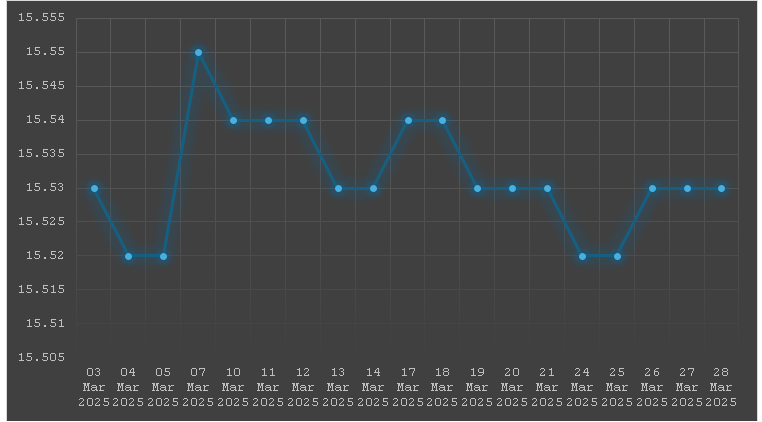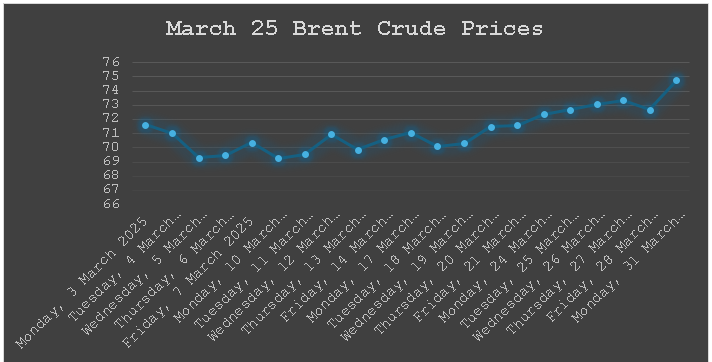Brief Commentary on March 2025 FX Rate Trends & Impact on Fuel Prices in Ghana
The USD/GHS exchange rate demonstrated remarkable stability throughout March 2025, which had significant implications for Ghana's fuel pricing landscape. This analysis examines the exchange rate trends and their effects on fuel prices in the local market.
Exchange Rate Stability Analysis
The USD/GHS exchange rate remained highly stable during March 2025, fluctuating between 15.52 and 15.55, reflecting effective monetary policy management by the Bank of Ghana. Key observations:
● The rate remained at 15.53 for seven trading days
● The highest recorded rate was 15.55 on March 7th
● The lowest recorded rate was 15.52, observed on March 3-5 and March 24-25
● The total fluctuation across the entire month was merely 0.03 GHS (0.19%)
Impact on Fuel Prices
The exceptional stability in the exchange rate has translated to predictable fuel pricing for Ghanaian consumers and businesses in March:
Stable Fuel Prices: The elimination of exchange rate-induced fluctuations allowed Oil Marketing Companies (OMCs) to maintain consistent pricing throughout the month.
Improved Business Planning: Transport operators and industries heavily dependent on petroleum products have benefited from enhanced ability to forecast operational costs.
Inflation Containment: The stability has helped contain the inflationary pressures typically associated with currency depreciation and subsequent fuel price increases.
Import Cost Predictability: Bulk Distribution Companies (BDCs) have experienced more predictable import costs, allowing for better inventory management and reduced hedging expenses.
Outlook
If the current exchange rate stability continues, we anticipate:
● Continued price stability at the pumps with variations primarily driven by international crude oil price movements rather than local currency fluctuations
● Potentially modest reductions in fuel prices if global oil prices remain low and the exchange rate stability persists
● Enhanced consumer and business confidence due to reduced uncertainty in fuel expenditure
The sustained stability of the USD/GHS exchange rate represents a positive development for Ghana's energy sector, contributing to a more predictable and potentially more affordable fuel pricing environment in the near term.
In March 2025, global crude oil prices experienced fluctuations due to various economic and geopolitical factors. Benchmark crude oil prices declined in February and early March amid concerns over the global economic outlook and oil demand growth. However, by the end of March, prices climbed approximately 2% to a five-week high, with Brent futures settling at $74.74 per barrel on March 31, influenced by supply concerns related to potential U.S. actions against Russia and Iran.
In Ghana, fuel prices reflected these global trends. The National Petroleum Authority (NPA) projected a decline in fuel prices by mid-March, anticipating reductions in petroleum product prices. By March 17, diesel prices stood at 15.79 Ghanaian cedis per liter. GOIL, a major oil marketing company, adjusted its prices effective March 18, with Super XP at GHC 14.99 per liter and Diesel XP at GHC 15.42 per liter. By March 24, gasoline prices were reported at GHS 15.36 per liter.
These adjustments highlight the relationship between international crude oil prices and domestic pricing mechanisms in Ghana. While global price shifts set the baseline, local factors such as exchange rates, taxes, and distribution costs also play significant roles in determining the final fuel prices at the pump.
Understanding March’s Fuel Price Decline: Key Drivers behind the Reductions
March saw a noticeable decline in fuel prices at the pumps, as Oil Marketing Companies (OMCs) adjusted their rates in response to shifting global and local economic factors. A mix of currency stability, international crude price movements, and geopolitical uncertainties played key roles in shaping fuel prices throughout the month.
1. A More Stable Cedi Softened Import Costs
The Ghanaian cedi depreciated by 5.5% against the U.S. dollar in March—an improvement from the 7.7% depreciation seen in previous periods. This relative stability meant that the cost of importing refined petroleum products did not rise as sharply, allowing OMCs to pass on some savings to consumers.
2. Declining Global Oil Prices Provided Relief
In the first half of March, Brent crude prices fell due to a critical policy shift from OPEC+, which announced plans to ramp up production starting in April. This decision helped ease supply constraints and contributed to a drop in global oil prices, reducing the cost of fuel imports for Ghana.
3. Market Uncertainty Dampened Demand
Beyond OPEC+ production increases, broader global market forces also influenced crude prices. Uncertainty stemming from former U.S. President Donald Trump's trade policy announcements created concerns about economic slowdowns,, which in turn lowered demand expectations for oil. This softer demand helped keep international crude prices in check, further reinforcing price reductions at the local pumps.
How Fuel Prices Reflected These Changes
By the end of March, fuel prices at the pumps had adjusted accordingly, reflecting these international and domestic trends.
The combination of currency stability, lower crude prices, and demand-side pressures contributed to a more favorable pricing environment for consumers. Looking ahead, further price adjustments will depend on how these factors evolve in the coming months.
Prices at Selected Local Pumps as at Wednesday, March 27, 2025
1. Star Oil Co. •Petrol - Ghc 14.37/LTR. •Diesel - Ghc 14.95/LTR
2. Allied •Petrol - Ghc 14.65/LTR. •Diesel - Ghc 14.85/LTR
3. ZEN •Petrol - Ghc 14.18/LTR. •Diesel - Ghc 15.08/LTR
4. JP •Petrol - Ghc 14.77/LTR. •Diesel - Ghc 14.97/LTR
5. Radiance •Petrol - Ghc 13.95/LTR. •Diesel - Ghc 15.25/LTR
6. PUMA •Petrol - Ghc 15.40/LTR. •Diesel - Ghc 15.60/LTR
7. GOIL •Petrol - Ghc 14.99/LTR. •Diesel - Ghc 15.42/LTR
8. PETROSOL •Petrol - Ghc 15.64/LTR. •Diesel - Ghc 15.89/LTR
9. Shell •Petrol - Ghc 15.20/LTR. •Diesel - Ghc 15.47/LTR
10. Total •Petrol - Ghc 15.49/LTR. •Diesel - Ghc 15.49/LTR


